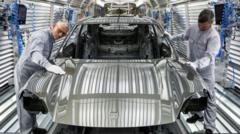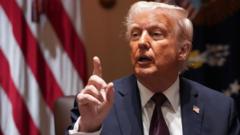Germany's Economy Minister emphasizes the need for collective resistance against proposed trade measures as global leaders voice concerns.
Germany Stands Firm Against Trump's New Car Tariffs

Germany Stands Firm Against Trump's New Car Tariffs
In response to the latest round of US tariffs, German leaders declare unwavering resolve and call for a united European front.
Germany has taken a resolute stance against US President Donald Trump's newly announced tariffs on imported cars and parts, stating unequivocally that it "will not give in" to these economic pressures. The tariffs, which impose a 25% tax on vehicles not manufactured in the US, are set to commence on April 2, sparking international backlash and calls for retaliation from significant world economies.
In response to Trump's measures, French President Emmanuel Macron labeled the tariffs a "waste of time" and "incoherent," while Canadian Prime Minister Mark Carney described them as a "direct attack" on Canada and its automotive sector. China also weighed in, accusing the US of violating international trade regulations, signaling a broad condemnation of the tariffs. Meanwhile, shares in car manufacturers, particularly in Germany and Japan, experienced notable declines, with General Motors falling 7% and Ford dropping over 2% in the US markets.
Trump asserts that the tariffs aim to bolster US manufacturing, asserting that American-made vehicles will incur "absolutely no tariff." However, the impact of these taxes could raise costs significantly for consumers, particularly if companies choose to pass on the expense. According to the Anderson Economic Group, estimates suggest that tariffs on parts alone from Canada and Mexico could inflate vehicle costs by $4,000 to $10,000.
At a press briefing on Thursday, German Economy Minister Robert Habeck advocated for a firm European response, stating that the EU must project strength and confidence. French Finance Minister Eric Lombard echoed these sentiments, stressing that retaliatory tariffs on US goods are necessary to establish balanced trade relations.
The UK’s car industry expressed disappointment at the implementation of tariffs, while John Neill, founder of Uniparts, argued that the US measures could inadvertently benefit Chinese manufacturers by driving international consumers to seek alternatives.
Concerns about the long-term effects of the tariffs extend to Japan, with officials indicating significant repercussions for US-Japan economic relations. Similarly, in South Korea, Hyundai has committed to a substantial investment of $21 billion in the US, with plans to establish a new steel plant in Louisiana, a gesture that President Trump hailed as evidence of the effectiveness of his tariffs.
As global economies navigate these tumultuous trade waters, leaders continue to advocate for a cooperative approach to negotiations while preparing for the ramifications of Trump’s aggressive tariff strategy.





















